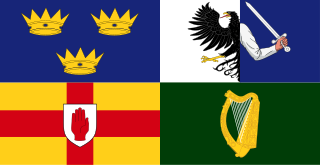
The history of Irish theatre begins in the Middle Ages and was for a long time confined to the courts of the Gaelic and "Old English" – descendants of 12th-century Norman invaders – inhabitants of Ireland. The first theatre building in Ireland was the Werburgh Street Theatre, founded in 1637, followed by the Smock Alley Theatre in 1662.

James Quin was an English actor of Irish descent.
Barton Booth was one of the most famous dramatic actors of the first part of the 18th century.
Irish Hospitality, or, Virtue Rewarded is one of the lesser-known works of the inconspicuous playwright Charles Shadwell, son of the far more renowned playwright and poet laureate Thomas Shadwell. It was published in his Five New Plays in 1720, and it is not known if it was ever acted at the time. In 1766 it was staged at the Drury Lane Theatre.

The patent theatres were the theatres that were licensed to perform "spoken drama" after the Restoration of Charles II as King of England, Scotland and Ireland in 1660. Other theatres were prohibited from performing such "serious" drama, but were permitted to show comedy, pantomime or melodrama. Drama was also interspersed with singing or dancing, to prevent the whole being too serious or dramatic.
Events from the year 1670 in Ireland.
Events from the year 1715 in Ireland.
Matthew Concanen was an Irish writer, poet and lawyer.
Macnamara Morgan (c.1720–1762) was an Irish playwright, poet, and barrister.

Since the 17th century, there have been numerous theatres in Dublin with the name Smock Alley.
Thomas Elrington (1688–1732), was an English actor.
John Leigh (1689–1726) was an Irish actor and dramatist.

Aungier Street is a street on the south side of Dublin, Ireland. It runs north-south as a continuation of South Great George's Street.
Jane Rogers was a British stage actress.
The Fair Quaker of Deal or, The Humours of the Navy is a 1710 comedy play by the British writer Charles Shadwell. A popular hit running for thirteen nights, it was revived a number of times.
Wexford Wells is a 1720 comedy play by the Irish writer Matthew Concanen.
Henry Giffard was a British stage actor and theatre manager.
A Wife and No Wife is a 1724 comedy play by the Irish writer Charles Coffey. It premiered at the Smock Alley Theatre in Dublin. The original cast included Richard Elrington and Thomas Hallam.
Thomas Griffith (1680-1744) was an Irish stage actor and theatre manager.
Margaret Osborne or Osborn was an English stage actress of the seventeenth century She was a long-standing member of the Duke's Company from 1671, acting at Lincoln's Inn Fields and the Dorset Garden Theatre. She went to Dublin to work at the Smock Alley Theatre in 1677, but returned to the Duke's Company around two years later She subsequently joined the merged United Company in 1682 and was still acting in the 1690s.




